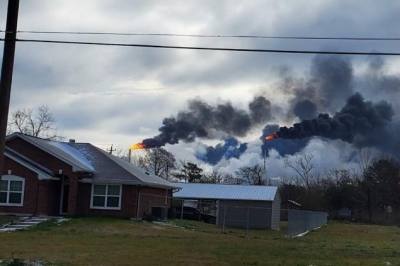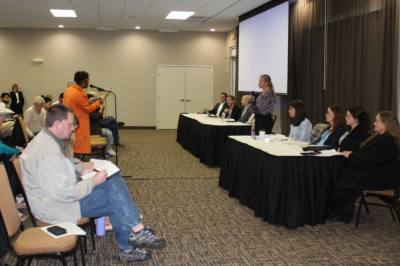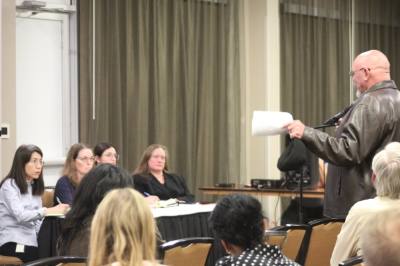"There's these sonic vibration shakes that cause cracks in my roof, in my foundation," Szumski said. "It's pretty bad. ... It's constantly. I refuse to put any more money in patching. My kitchen ceiling has been patched three times. "
He said contractors offer him bids ranging from $25,000 up to $45,000 to try and fix the house's foundation. Yet, one thing contractors won't guarantee, he said, is a warranty because of the proximity of his home to one of the world's largest petrochemical complexes in the world—Exxon Mobil's Baytown Olefins Plant.
Sorting out details
Szumski was one of more than 40 community members who attended a public hearing Feb. 5 with officials from Exxon Mobil Corporation and the Texas Commission on Environmental Quality, the state organization responsible for permits and enforcing environmental laws. A new national air quality standard was announced two days later by the U.S. Environmental Protection Agency that aims to lower the amount of fine particulate pollution emitted by power plants, vehicles and industrial facilities.
Szumski said the environmental group Air Alliance Houston recently installed an air monitor in his front yard. He said he's happy to help his community "breathe clean air and catch polluters."

The hearing was organized by TCEQ in order for the public to voice concerns or comments regarding Permit 1610, the Baytown plant's federal permit renewal application.
According to Exxon's website in 2023, the plant:
- Manufactured approximately 10 billion pounds of petrochemical products each year that are shipped through pipeline
- Utilized three products: ethylene, found in plastic packaging; propylene, found in upholstery and carpeting; and butadiene, found in tires, fabrics and rubber
- Raised $1.2 million for the United Way of Greater Baytown Area
- Contributed more than $1.1 million in charitable contributions in Baytown
According to the TCEQ, the purpose of a federal operating permit is to improve overall compliance with the rules governing air pollution control defined by Texas law and establish federally enforceable emission limits.
Yet, when it comes to the facility's accountability with the emissions entering Harris County's neighborhoods and the overall atmosphere, lines of community members were not in favor of Exxon's current practices.
"We do not want to pay for our own deaths. This is not working. How many people have to come here telling you their family members have died?" Dominic Chacon said.

According to the December report by environmental group Air Alliance Houston, industrial emissions in Harris County are impacting asthma rates and excess deaths to what researchers have found could come out to more than $3,000 in asthma-related medical expenses.
- Researchers in the report estimated the air pollution coming from Harris County facilities cost the community more than $313 million annually in asthma-related medical expenses.
- The report states Exxon's Olefins plant was one of the top two emitters of fine particulate matter.
The other side
Inyang Uwak with Air Alliance Houston said Exxon could take more steps to protect the host community. Uwak said while Exxon's 2015-20 data on emissions is publicly available, the TCEQ's emissions data paints a different picture in 2023.
"It's not reducing. You have been exceeding your permitted levels of nitrogen dioxide emissions," she said.
Uwak suggested the extra funding being poured into the community for fundraising and nonprofits won't be helpful if the community is constantly sick or ill.

Zooming out
Harris County's 2023 health disparities annual report listed five social determinants of health and stated health factors, such as the conditions of where people live and work, affect one's overall quality-of-life outcomes.
When it comes to addressing the health impacts in the county, Barbie Robinson, Harris County Public Health director, said in an email that everyone must make a collective effort and be committed to addressing these issues.
"HCPH collaborates with Pollution Control Services (PCS) to address environmental health concerns in Harris County. PCS does in-field air monitoring that HCPH uses in conjunction with health surveillance data to measure health impacts during chemical incidents. Additionally, both organizations are working together to improve data sharing and expand chemical datasets necessary for emergency response and assessing health risks," Robinson said.









